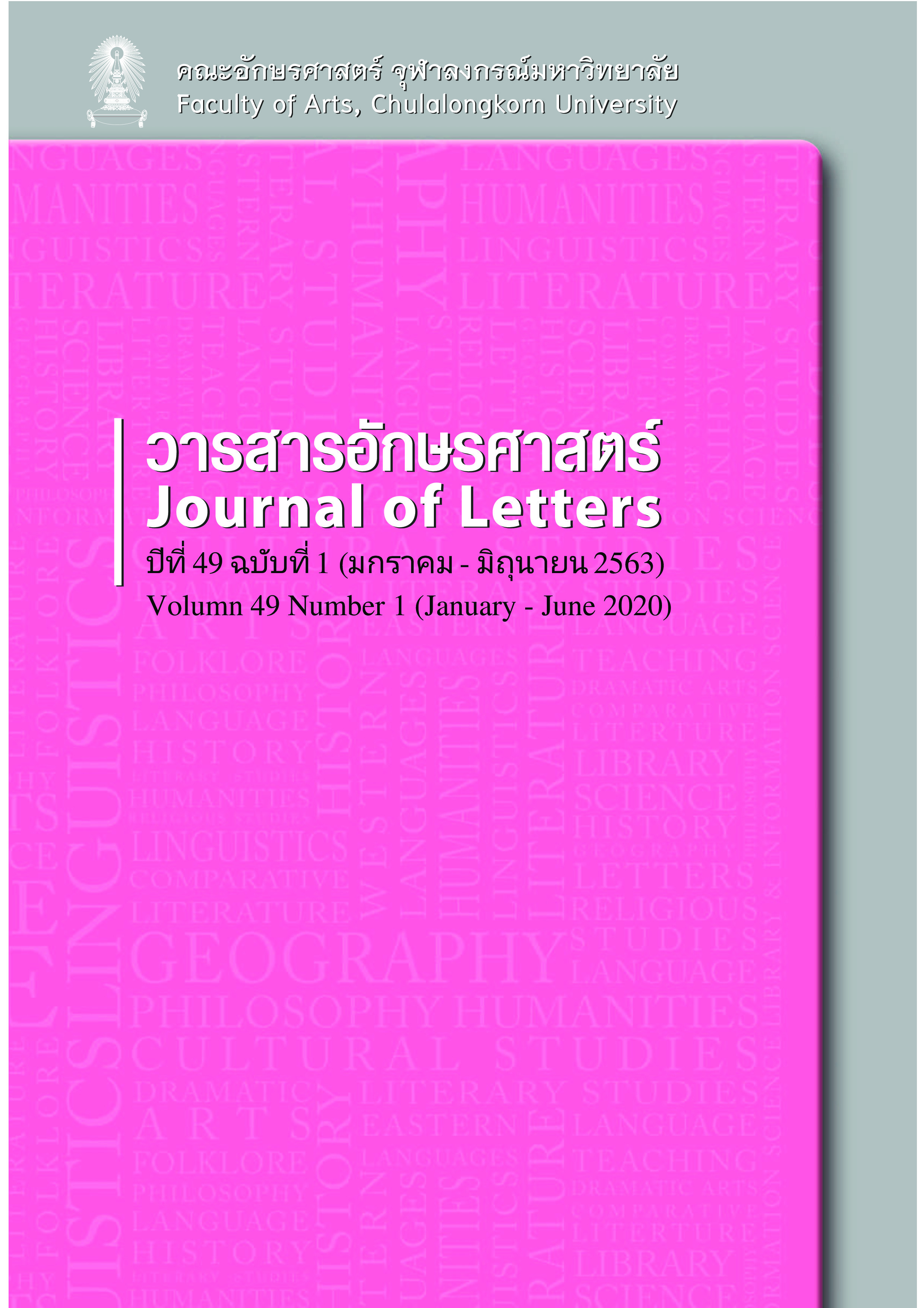The Adjectives as a Word Class in Arabic: The Linguistic Analysis
Linguistic Analysis
Keywords:
adjective, word class, Arabic language, Decategorization, Part of SpeechAbstract
Traditional Arabic grammar divides Arabic words into 3 categories: nouns, verbs and prepositions. Adjectives are not a traditional word class, but realized as syntactic positions in sentences, an approach which is followed in practice. However, the researcher proposes that adjectives should be considered a distinct word class separate from nouns. This is based on various evidence, such as typology, morphology and syntax. In certain contexts, adjectives can appear instead of nouns or eventually decategorize to noun but this does not mean that Arabic should have no adjective category.
References
ภาษาอังกฤษ / English
Aarts, B., & Haegeman, L. 2006. English Word Classes and Phrases. In The Handbook of English Linguistics, Bas Aarts, and April McMahon, eds., 117-145. MA: Blackwell Publishing.
Alfieri, Luca. 2014. Qualifying Modifier Encoding and Adjectival Typology. In Word Classes: Nature, Typology and Representations, Raffaele Simone, and Francesca Masini, eds., 119-138. Amsterdam: John Benjamins Publishing Company.
Arcodia, Giorgio F. 2014. The Chinese Adjective as a Word Class. In Word Classes: Nature, Typology and Representations, Raffaele Simone, and Francesca Masini, eds., 95-118. Amsterdam: John Benjamins Publishing Company.
Bhat, D. N. S. 1994. The Adjectival Category: Criteria for Differentiation and Identification. Amsterdam: John Benjamins Publishing Company.
Bhat, D. N. S. 2000. Word Classes and Sentential Functions. In Approaches to the Typology of Word Classes, Petra M. Vogel, and Bernard Comrie, eds., 47-64. Berlin: Mouton de Gruyter.
Bisang, Walter. 2012. Word Class. In The Oxford Handbook of Linguistic Typology, ed. Jae Jung Song. doi:10.1093/oxfordhb/9780199281251.013.0015
Croft, William. 2000. Parts of Speech as Language Universals and as Language-Particular Categories. In Approaches to the Typology of Word Classes, Petra M. Vogel, and Bernard Comrie, eds., 65–102. Berlin: Mouton de Gruyter.
Diem, Werner. 1971. Nomen, Substantiv und Adjektiv bei den arabischen Grammatikern. Oriens 23–24: 312–332.
Dixon, R. M. W. 1982. Where Have All the Adjectives Gone?: And Other Essays in Semantics and Syntax. Berlin: Mouton de Gruyter.
Dixon, R. M. W. 2004. Adjective Classes in Typological Perspective. In Adjective Classes: A Cross-Linguistic Typology, R. M. W. Dixon, and A. Y. Aikhenvald, eds., 1-49. Oxford: Oxford University Press.
Fischer, Wolfdietrich. 2006. Adjective. In Encyclopedia of Arabic Language and Linguistics (Vol. 1), Kees Versteegh, Mushira Eid, Alaa Elgibali, Manfred Woidich, and Andrzej Zaborski, eds., 16-21. Leiden: Brill.
Gai, Amikam. 1995. The Category ‘Adjective’ in Semitic Language. Journal of Semitics Studies XL(1): 1-9.
Jackson, Howard. 2007. Key Terms in Linguistics. London: Continuum.
Kasher, Almog. 2009. The Term ISM in Medieval Arabic Grammatical Tradition: A Hyponym of Itself. Journal of Semitic Studies 54(2): 459-474. https://doi.org/10.1093/jss/fgp009
Luraghi, S., & Parodi, C. 2008. Key Terms in Syntax and Syntactic Theory. London: Continuum.
Murphy, M. L., & Koskela, A. 2010. Key Terms in Semantics. London: Continuum.
Panagiotidis, Phoevos. 2015. Categorial Features: A Generative Theory of Word Class Categories. Cambridge: Cambridge University Press.
Post, Mark. 2008. Adjectives in Thai: Implications for a Functionalist Typology of Word Classes. Linguistic Typology 12(3): 339–381. https://doi.org/10.1515/LITY.2008.041
Prasithrathsint, Amara. 2000. Adjectives as Verbs in Thai. Linguistic Typology 4(2): 251-271.
Rijkhoff, J., & Van Lier, E. 2013. Flexible word classes: Typological studies of underspecified parts of speech. Oxford: Oxford University Press.
Schachter, P., & Shopen, T. 2007. Part of Speech Systems. In Language Typology and Syntactic Description: Clause Structure (Vol. 1), ed. Timothy Shopen, 1-60. Cambridge: Cambridge University Press.
ภาษาอาหรับ / Arabic
Al-bābīdī, A. M. البابيدي، أحمد بن مصطفى. 1997. Muʽjam asmāʼu l-asmāʼ: l-laṭāʾifu fī l-lughah معجم أسماء الأشياء: اللطائف في اللغة. [The Lexicon of Things’ Names: The Delicacies in Language] (Revised by Abd Tawab Iwadh). Cairo: Al-fadhilat House Publishing.
Al-Dahdāh, A. الدحداح، أنطوان . 1996. Muʿjam Qawaʾid l-lughah l-ʿarabīyah fī Jadāwil wa Lawḥāt.
معجم قواعد اللغة العربية في جداول ولوحات [A Dictionary of Arabic Grammar in Charts and Tables] (Revised by Abdul-massih). Beirut: G.M. Lebanon Library.
Al-ghaylāyyinī, M. الغيلاييني، مصطفى. 2003. Jāmiʿa l-durūs l-ʿaarabīyah. جامع الدروس العربية [The Comprehensive of Arabic Lessons] (Revised by Salim Sham Al-Din). Sidon-Beirut: Al-assrya Library Publishing.
Al-khuḍrī, M. الخضري، محمد 1998. Ḥāshīyah l-khuḍrī. حاشية الخضري [The Marginal Annotation of l- khuḍrī] (Vols. 1-2; Revised by Turkey Farhan Al-Mustafa). Beirut: Academic Book House Publishing.
Ibn ʿaqīl, B. ʿA. ابن عقيل، بهاء الدين عبد الله 2002. Sharḥ Ibn ʿaqīl. شرح ابن عقيل . [The Commentary of Ibn ʿaqīl] (Vols. 1-2; Revised by Mohammad Mahudin Abd Al-Hamid). Sidon-Beirut: Al-assrya Library Publishing.
Ibn l-ḥājib, R. M . ابن الحاجب، رضي الدين محمد1998. Sharḥ Kāfiyah ibn l- ḥājib. شرح كافية ابن الحاجب. [The Commentary for Kāfiyah of ibn l- ḥājib ] (Vols.1-2; Revised by Amil Badiʽ Yaʽqub). Beirut: Academic Book House Publishing.
Sībawayh, A. A. سيبويه، أبو بشير عمرو بن عثمان 1988. Kitāb Sībawayh. كتاب سيبويه [The Book of Sībawayh] (3rd ed.; Revised by Abdussalam Muhammad Harun). Cairo: Al-khanijy Library Publishing.
Downloads
Published
How to Cite
Issue
Section
License
Copyright and plagiarism
Authors are responsible for obtaining permission to use copyrighted materials from copyright owners. Authors are responsible for observing requisite copyright law when quoting or reproducing copyrighted materials. Quotations and reproductions of content from other published sources must be accompanied by a reference and all sources should be clearly listed in the references section. Quotations and reproductions of content from external sources without due attribution could be considered a severe infringement of academic conduct and may constitute a legal offence under the Copyright Act of B.E. 2537. Any legal ramifications arising from the infringement of copyright regulations would be the sole responsibility of the author(s).



